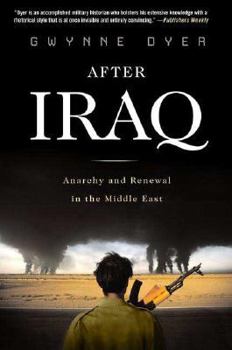After Iraq: Anarchy and Renewal in the Middle East
Select Format
Select Condition 
Book Overview
"The Iraqi state that was formed in the aftermath of the First World War has come to an end. Its successor state is struggling to be born in an environment of crises and chaos." --- Ali Allawi, Iraq's... This description may be from another edition of this product.
Format:Hardcover
Language:English
ISBN:0312378459
ISBN13:9780312378455
Release Date:February 2008
Publisher:Thomas Dunne Books
Length:267 Pages
Weight:0.85 lbs.
Dimensions:1.0" x 5.9" x 8.5"
Customer Reviews
3 ratings
Very useful study of the malign effects of foreign interference in the Middle East
Published by Thriftbooks.com User , 15 years ago
Gwynne Dyer used to be a Senior Lecturer at the Royal Military Academy, Sandhurst. In this useful book, he outlines the changes coming to the Middle East, changes unleashed by the US/British invasion of Iraq and the destruction of the Iraqi state. He points out that the attack on Iraq made Britain a target for terrorism. As the head of MI5 said, "The video wills of British suicide bombers make it clear that they are motivated by perceived worldwide and longstanding injustices against Muslims ... and their interpretation as anti-Muslim of U.K. foreign policy, in particular the U.K.'s involvement in Iraq and Afghanistan." Dyer predicts that the Middle East's countries will soon be ruling themselves. He argues that outside governments and peoples should let this happen, because "foreign intervention generally makes things worse - but also because it's none of their business." There are no outside solutions and outsiders have neither the right nor the power to interfere. Even the US military cannot dictate outcomes in the Middle East. As he notes, "The West will stop meddling in the region's affairs, because the United States is going home hurt." The Middle East of course has half the world's oil, but it's no good to its rulers unless they sell it, so, as Dyer asserts, "it doesn't matter to us who runs these countries." And he writes of Afghanistan, "the current intervention was probably always destined to end in failure." So he urges the US and British states to cut their losses and go home. Yet there is a danger that the USA will lash out before it goes, as it did in South-East Asia. In 1995, the usual `senior CIA official' told the New York Times that Iran would have nuclear bombs by 2000. We have heard warmongering like this ever since. More truthfully, the IAEA's director general Mohamed El-Baradei said last year, "the intelligence, the British intelligence, the American intelligence, is that Iran is still years, five to ten years, away from developing a weapon." Any US attack on Iran would be insanely dangerous.
Brilliant! An Education
Published by Thriftbooks.com User , 15 years ago
Dyer puts Iraq and the U.S.'s whole Mideast policy in context. His analysis is rightly historical. He calls the Iraq war a "small colonial war"--and, like almost all the wars of empires against their (would-be) colonies since WWII, a failure. He says that the entire Arab world, with few exceptions, has been ready for change for the last 30 years, because the post-WWII regimes have been dictatorial puppets of one great power or another (chiefly because of oil). And the lack of democratic alternatives has pushed some opposition groups into fundamentalist, jihadi options. The jihadis always made up a small (though violent) minority; but recent U.S. actions have greatly strengthened them. Through a combination of ignorance, arrogance, vanity, and self-delusion, the Bush administration believed they could install democracy in Iraq--and then in the entire region, reverse-domino-like. But of course for Bush and Co., "democracy" does not mean what it normally means: self-rule, thoroughly representative government, and protection of fundamental rights. It means "rule by crony and CEO, with show-elections every so often among hand-picked candidates." The U.S. invaded Iraq to establish permanent bases there, since its bases in Saudi Arabia are in jeopardy, from hatred of U.S. troops on holy soil. (Osama bin Laden claimed he ordered attacks on the U.S. because of U.S. bases in Saudi Arabia, and there is no reason to doubt this.) This was immediately recognized throughout the region as just one more colonialist effort, and has swelled jihadist ranks everywhere. Dyer rightly says that terrorism cannot be dealt with militarily, but only made worse. And with great clarity and comprehensiveness, he reviews each nation in the Mideast, including Israel and Iran, and sketches the forces that have led us to what he calls the "current mess." He also outlines likely future scenarios, from worst-case to least-bad. A thrilling, informative book.
"The Mess They Made"
Published by Thriftbooks.com User , 16 years ago
Note that this book is also called 'The Mess They Made', and is available in paperback. Be careful lest you buy both books, as I did. Thankfully it was easily returned. Gwynne Dyer's reputation preceeds him. His analysis is thoughtful and convincing, even though I disagree with his overall conclusion (- this was written before the 'Surge'). It's a shame you can't 'Search Inside' this book to get a same of his prose and style, which is very sharp, informative and stimulating to read. Highly Recommended.




